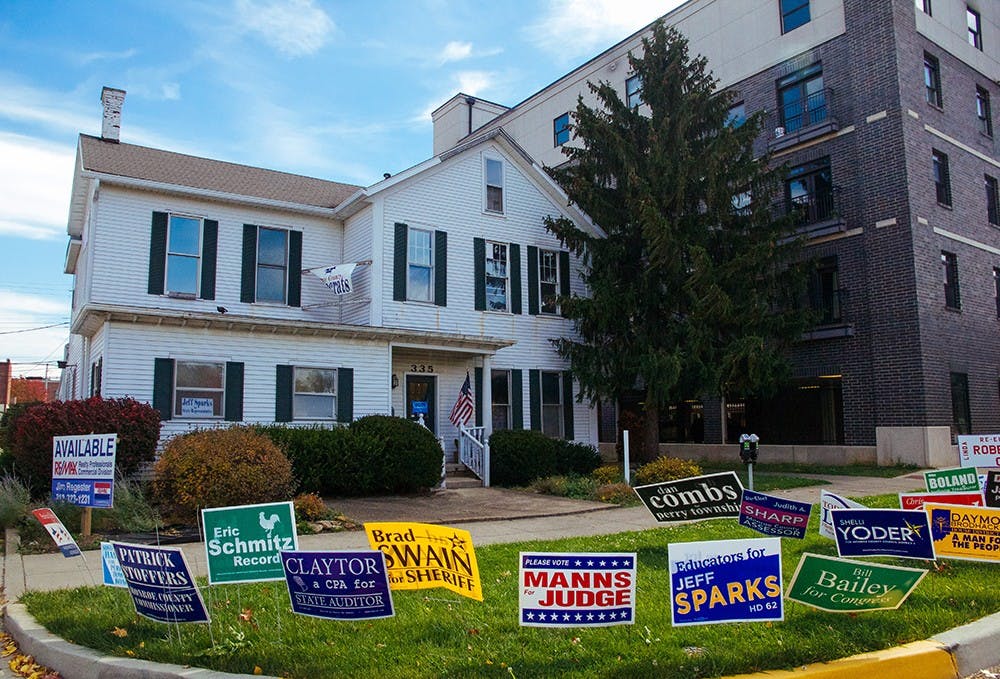Davidson, a local Democrat, was on the west side of Indiana State Road 46 near Ellettsville when she saw one of the advertisements leaning against a state highway sign, she said.
“I took it,” she said. “I ended up picking up three or four. One was litter, and I picked it up so it wouldn’t be litter.”
All of the signs were on public property near the intersection of SR 46 and Curry Pike, where it is illegal to post them, Davidson said.
A local law enforcement officer saw Davidson putting the signs in the trunk of her vehicle before pulling her over. She said the officer was confused about how to handle the situation and even had to call and check if there was a violation on Davidson’s part.
A report was filed with the County Sheriff’s Department, but Davidson was not fined or charged with a crime.
Posting advertising signs, signals or devices — like the Republican advertisements taken by Davidson — are not to be posted in right-of-way areas, according to the Indiana District of Transportation and upheld by Indiana Code.
These areas include interstates and intersections where local, state or federal roads cross with a state or federal highway.
Davidson saw that a law was being broken and sought to remedy the situation — a practice she said was a form of “democratic participation.”
However, while the code upholds that posting advertisements in rights-of-way is a violation of the law, it also says only an authority having jurisdiction over the highway, like the Indiana Department of Transportation, can remove the advertisements. Davidson cannot.
Protecting one law does not excuse the fact that Davidson violated another, said Jacob Moore, Republican candidate for Monroe County Prosecuting Attorney.
“She is not authorized to remove these signs, even if her claims are true,” he said.
Moore said he believes those claims are hardly to be accepted at face value.
“When you have someone allegedly caught red-handed stealing a sign, their word is probably not to be accepted without question,” he said.
While he does not believe Davidson’s claims are true, he did admit it is possible and cannot be proven false without investigation.
But Davidson said she felt it was necessary to do the job herself. She said complaints to INDOT have not yet prompted them to remove the signs and that having a law stating that a specific authority remove the signs is not a viable solution.
The issue is parallel to Buzzell vs. State, a 1994 state appellate court case.
In 1992 Christopher Buzzell was arrested in Muncie, Ind., for removing political signs from yards and highway rights-of-way, an act of retribution against those who stole his mother’s political signs.
In a trial by jury, Buzzell was found guilty of three counts of conversion, or the exertion of unauthorized use over someone else’s property. The case was appealed by Buzzell but affirmed by the appellate court in 1994. Once again, his indictment was three counts of conversion — one count for each candidate whose signs Buzzell had taken.
But Davidson was never charged with a crime, and the signs she took only urged people to vote Republican. They didn’t bear the name of any candidate and therefore did not belong to any of them. But the signs did belong to someone.
The signs Davidson took were paid for by the Take Back Monroe County Political Action Committee, which is organized by Grassroots Conservatives.
The signs cost the political group $2 each but could not be bought on an individual basis.
Of the 2,000 signs planted by Grassroots Conservatives throughout the county, more than 100 of them are currently missing, an issue Robert Hall, the founder and coordinator of the Grassroots Conservatives, said he believes is perpetrated by what may be an organized effort of those against the Republican Party.
“It’s just sad that they’d stoop to childish behavior,” Hall said. “They are being bullies. The First Amendment allows free and political speech.”
Davidson says her actions were independent and that at no time were there discussions with anyone else to go out and steal the signs.
She also maintains that posting the advertisements in highway rights-of-way is an ongoing issue.
“I think the real issue is why is this so pervasive? And why does it seem that there is only one party doing so much of it?” she said.






